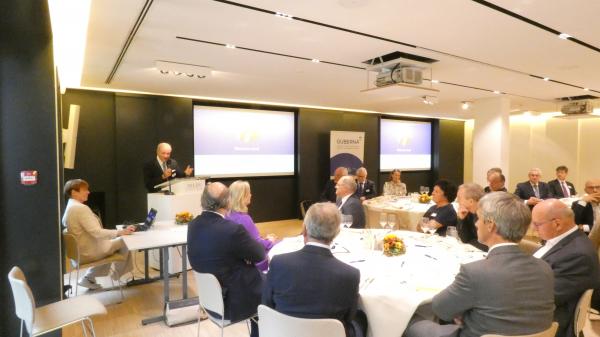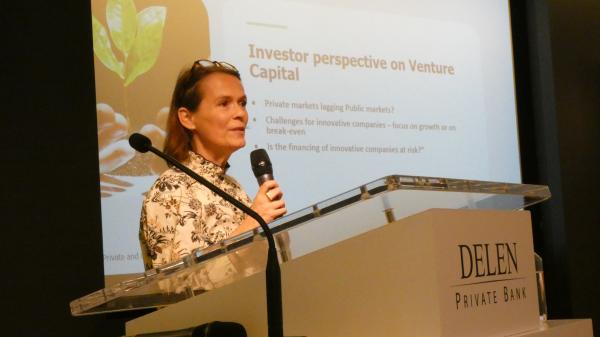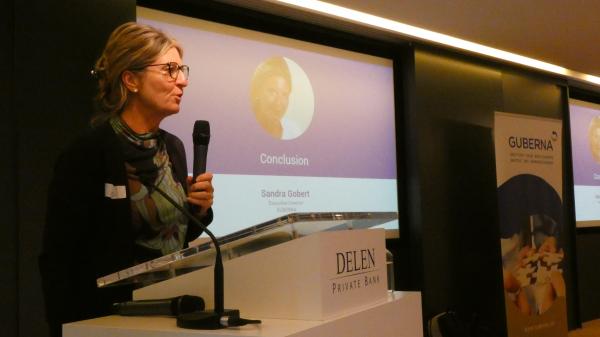Looking back at the GUBERNA Board of Trustees 2022
Toekomstdenken vanuit de realiteit van de huidige crisis: Enkele constructieve voorstellen en denkpistes van onze GUBERNA Board of Trustees.
Hoe moeten wij als bestuurders en ondernemers omgaan met de huidige crisis en de nakende recessie ? Wat verandert er op het vlak van deugdelijk bestuur en duurzaam ondernemen? Welke strategische pijlers houden stand? Hoe kan GUBERNA zijn leden daarbij inspireren?

Jaarlijks treffen
Eén keer per jaar roept GUBERNA zijn “Board of Trustees” samen: dit is het adviesorgaan samengesteld uit vertegenwoordigers van de Belgische economie en de sleutelvertegenwoordigers van de GUBERNA Premium Corporate leden, onder leiding van -Board of Trustees voorzitter Luc Bertrand, dat zich een keer per jaar buigt over strategische kwesties die de organisatie aanbelangen. Ook deze keer werd het gezelschap gastvrij ontvangen in de Bank Delen in Brussel.
De middagsessie ving aan met drie korte maar beklijvende “expert insights” van de drie nieuwe GUBERNA-bestuurders. Zij brachten elk vanuit hun eigen expertise een marktoverzicht van de belangrijkste ontwikkelingen in hun vakgebied.

Prof.dr. Kurt Deketelaere (directeur Instituut voor Milieu- en Energierecht KU Leuven) ziet in de huidige klimaat- en energiecrisis een combinatie van een risico op korte termijn en een opportuniteit op lange termijn. Maar intussen krijgen de grote EU-landen het intern zeer moeilijk. Blijft er dan op Europees vlak nog voldoende budget en beleidsruimte over om tegen 2030 resp. 2050 de afgesproken duurzaamheidsdoelen te realiseren…
Daarna maakte Katrin Geyskens (partner bij Capricorn Partners) enkele economische reflecties over bedrijfswaarderingen en kapitaalverhogingen in tijden van grote marktonzekerheid. Gelukkig blijft er nog steeds genoeg kapitaal beschikbaar voor goede projecten…
Pierre-Henri d’Haene (Head of Sustainability bij Elia) sloot af met een kritische én wiskundige kijk op het gebrek aan financiële middelen en de juiste grondstoffen om onze economie koolstofarm en duurzaam te maken zonder in te boeten aan welvaart. Of stevenen we sowieso af op een collectieve verarming…
Tafelgesprekken
Hun inleidingen lanceerden meteen ook de workshops over de gewenste respons op de crisis(sen). De aanwezigen discussieerden per tafel ondermeer over de mogelijke gevolgen op het bestuurlijk beleid van onze organisaties en op de concrete inhoudelijke invulling van het strategisch GUBERNA-thema “CAP 2030 - Governance in Transition”. Hier volgt een synthese van de proefballonnetjes, bedenkingen, waarschuwingen en andere aanbevelingen:
-
Geloofwaardigheid heeft ook zijn waarde
Het algemeen imago van de Belgische ondernemingen is momenteel niet bijster positief. Mede door de spanningen in verband met de energieprijzen en de algemene verarming door de inflatie beschouwt de goegemeente de ondernemingswereld niet echt als een partner in de transitie naar een duurzame wereld. We moeten extra inspanningen leveren om de geloofwaardigheid van en het vertrouwen in de ondernemingen te verhogen. Misschien moeten we naar ‘een nieuw sociaal contract’ dat leidt tot een grotere maatschappelijke legitimiteit? -
Scenariodenken, nu!
Eigenlijk waren de ondernemingen, en meer specifiek hun raden van bestuur, totaal onvoorbereid op de huidige crisissen. Dit onderstreept eens te meer het belang van mentale weerbaarheid door middel van structureel toekomstdenken en visionaire scenario-analyses in de raad van bestuur. We moeten meer investeren in de kunst van het ‘vooruitdenken’. We kunnen de toekomst natuurlijk niet voorspellen maar kunnen en durven we wat vaker denken aan het ondenkbare? -
Korte versus lange termijn
Het langetermijnbelang van goed bestuur neemt almaar toe maar sommige belangrijke beslissingen worden nog te veel vanuit een korte termijnoogpunt genomen. Anderzijds moet de langetermijnstrategie van het bestuur meer aansluiting vinden bij de korte termijn wendbaarheid van het management. Maar waar ligt het ideale evenwicht? -
Meer competenties nodig in de raad
De duurzaamheidsregelgeving en de bijhorende maatschappelijke verwachtingen nemen overhand toe in volume en complexiteit. Enkel juridische en financiële knowhow volstaan niet langer. Raden van bestuur moeten zelf op zoek naar meer nieuwe kennis en vaardigheden: technische ESG-competenties, (geo)politiek inzicht, cyberveiligheid en divers jong talent dat het beraad kan verrijken. Aansluitend moet ook de raad van bestuur in deze uitdagende tijden meer ”leiderschapskwaliteiten” ontwikkelen voor zijn essentiële interactie met het management. Want de uitdagingen zijn zeer complex. Uiteraard impliceert dit dat bestuurders zich nog beter, langer en grondiger zullen moeten voorbereiden op basis van nog betere informatie. -
Dromen van andere KPI’s of ratio’s
Niet alleen het milieu-effect (vervuiling, uitputting van grondstoffen en energieverbruik) maar ook de sociale gevolgen (sociale zekerheid, onderwijs en vorming) komen te weinig op de klassieke balans of resultatenrekening van onze ondernemingen. Een experiment dat de klassieke productiefactoren overstijgt in de richting van een sluitende “sustainability accounting” van de externaliteiten lijkt ons wenselijk. Zou dat geen totaal ander maar tegelijk realistischer beeld geven op ons “BNP” en op de “waardecreatie” of waarde-destructie van onze economie? -
Nieuwe interne governance
De complexe en aan het bedrijf aangepaste omgang met de vele uitdagingen van duurzaam ondernemen (ESG) vergen een nieuw soort “operationele governance” in de organisatie zelf. We hebben instrumenten en richtlijnen nodig om deze transitie operationeel te realiseren in de huidige structuren. Wie is waarvoor verantwoordelijk? Wie rapporteert aan wie? Hoe kan je de levensbelangrijke ESG-imperatief met succes in je structuren en afdelingen incorporeren? -
Dialoog met de overheid
De maatschappelijke impact van elk ondernemingsinitiatief kan erg groot zijn en de wisselwerking met de overheid en de maatschappelijke geledingen wordt steeds belangrijker. Misschien kunnen raden van bestuur dit visualiseren door op hun bijeenkomsten zichtbaar een ‘lege stoel’ te voorzien voor de overheid, als vertegenwoordiger van de maatschappij. Dit beeld kan bestuurders helpen om bij elke beslissing ook na te denken over de impact op of de maatschappelijke verantwoordelijkheid naar en van de overheid en daar eventueel ook extra inspanningen rond te voorzien.

Een constructieve bijeenkomst
De tijd was uiteraard te kort om alles terdege uit te praten. Maar CEO Sandra Gobert toonde zich in haar slotwoord heel dankbaar voor deze constructieve aanzetten. Dit was bijgevolg een vruchtbare middag in het uitgebreid consultatie- en planningsproject dat GUBERNA hierover uitwerkt. Trouwens, ook uw reacties en overwegingen zijn hier zeer welkom
